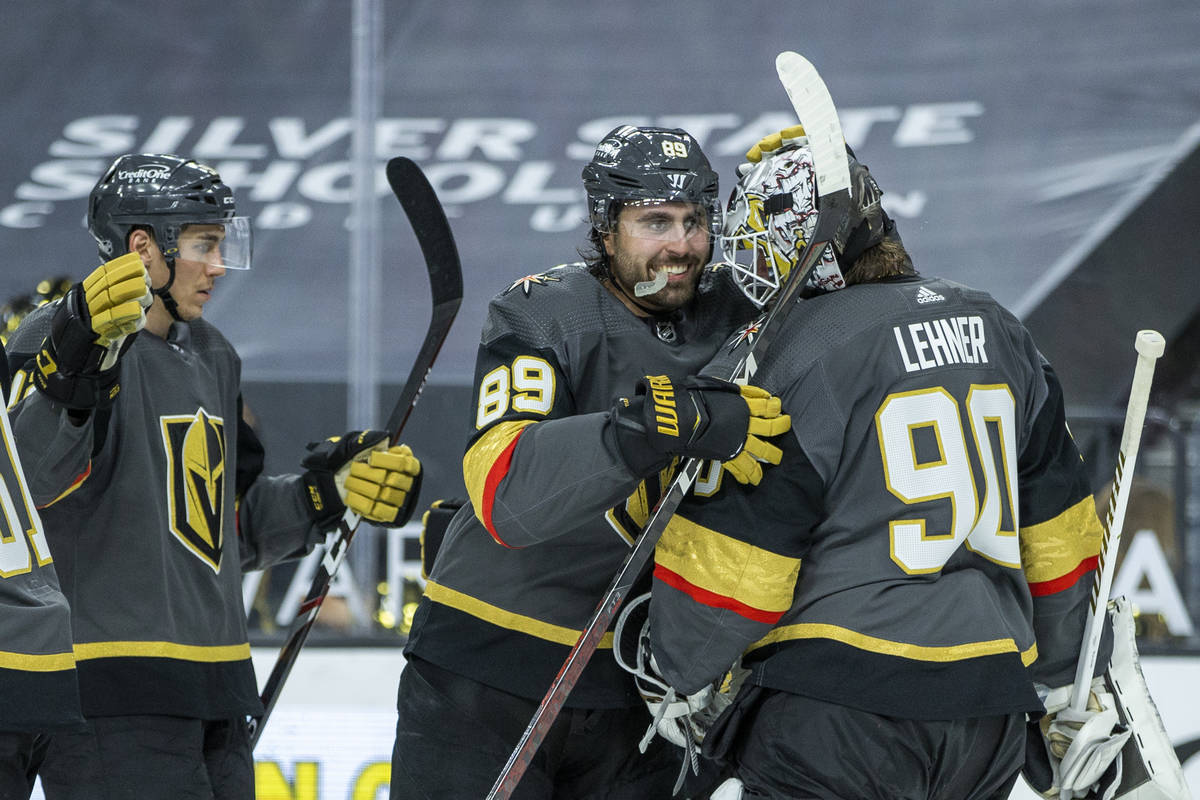Alex Tuch takes crash course on how to win faceoffs

Alex Tuch took a knee near center ice late in practice Friday and stared intently at the faceoff dot where two of his teammates squared off.
The winger was an eager student hoping to glean any morsel of information from the encounter that will help during his own endeavors in the faceoff circle.
“I was working after practice, watching video and working on different techniques and where success has come for me in the past. Working to get better,” Tuch said. “Obviously, I just had one faceoff (Thursday) night and 0-for-1, but hopefully get better from there.”
One of the biggest secrets of training camp was how the Knights’ power play units would be configured, with the team going to great lengths to avoid practicing special teams during sessions open to the media.
When they were finally revealed in the first period of Thursday’s 5-2 victory over Anaheim at T-Mobile Arena, the second unit featured no natural centers with Tuch, Jonathan Marchessault and Reilly Smith joined by defensemen Alec Martinez and Shea Theodore.
Coach Pete DeBoer acknowledged it’s not ideal on faceoffs, and the issue reared its head in the opener when Tuch lost the draw and the Ducks were able to clear the zone.
But as the Knights get ready to complete their two-game set against Anaheim on Saturday at T-Mobile, it’s a sacrifice he’s willing to make to feature two balanced power plays rather than loading up on the No. 1 unit.
“We’re hoping that the faceoff situation guys will dig in, guys will help each other, some guys will become better at it, that it won’t be an issue,” DeBoer said. “But it’s something that if we can’t get fixed with the personnel we have, we might have to look at some different options. But right now, we love the feel of the two units when they get the puck and get set up, so we’re willing to give up a little from the faceoff department to start.”
Tuch has taken 306 faceoffs in his Knights’ career and has a 39.5 winning percentage. Marchessault is the most experienced faceoff man with nearly 1,000 draws to his credit since 2017-18 but won only 41.9 percent.
Smith rarely ventures into the circle, and his 38.2 career faceoff percentage might be why.
Should faceoffs become a persistent problem, DeBoer could swap Smith and center William Karlsson, who both were stationed at the “bumper” spot in the middle of the formation on their respective units. Karlsson has a 47.7 career faceoff percentage.
Last season, the Knights finished ninth in the NHL on the power play at 22 percent, but DeBoer thinks their struggles with the man advantage prevented them from advancing further in the playoffs.
During the Western Conference Final, the Knights went 3-for-22 on the power play and lost in five games. DeBoer noted Tampa Bay had fewer chances (19) with the man advantage against Dallas in the Stanley Cup Final but scored seven goals in the six-game series.
“I really felt when I looked back at our series against Dallas and Tampa Bay’s series against Dallas, I really think one of the key differences was Tampa’s execution on the power play and their ability to score on the power play,” DeBoer said. “It was an area of emphasis for us in the offseason.
“Especially the deeper you go in the playoffs and the better the opponent, those little details, your faceoffs, special teams, things like that usually separate the teams at that point.”
Contact David Schoen at dschoen@reviewjournal.com or 702-387-5203. Follow @DavidSchoenLVRJ on Twitter.